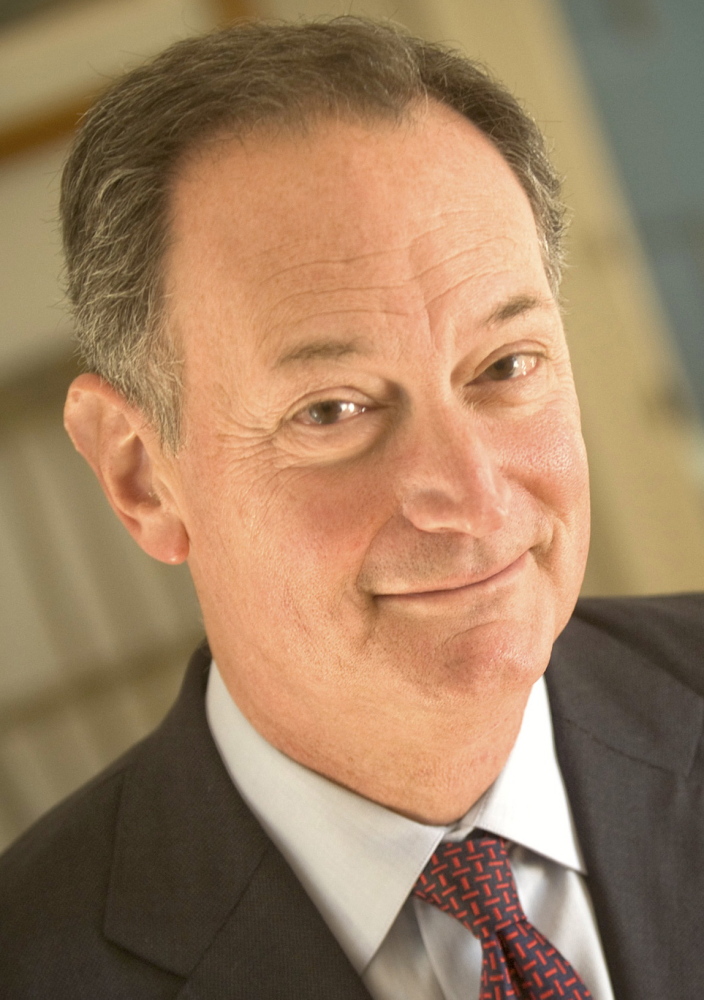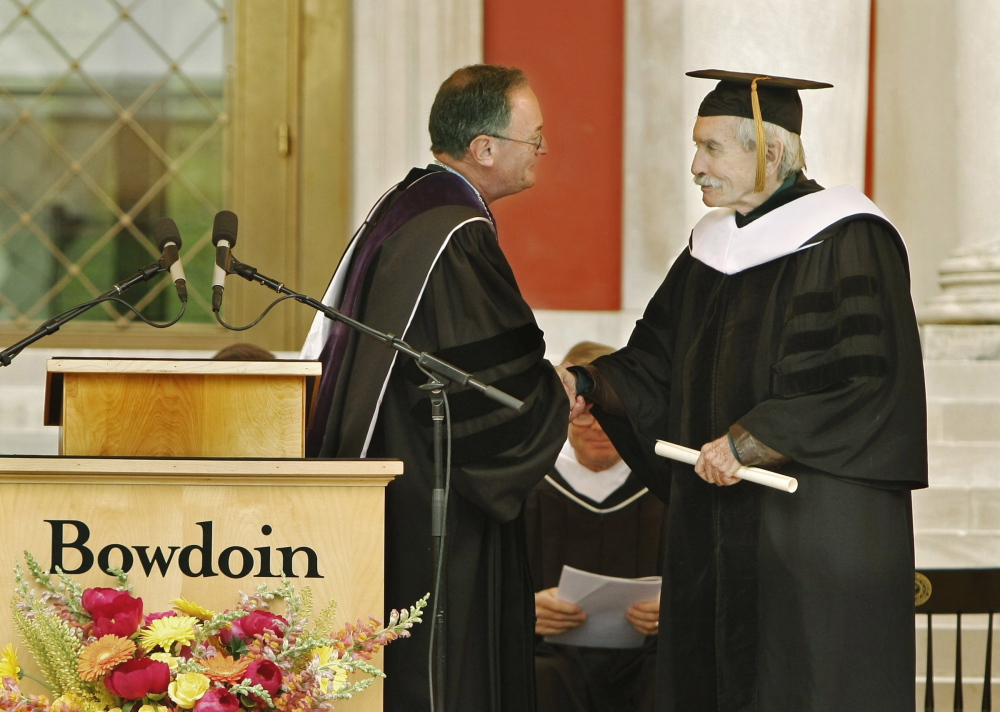BRUNSWICK — Bowdoin College President Barry Mills announced Monday that he will step down in June 2015 at the end of his 14th academic year as head of Maine’s oldest college.
“It has been a joy to lead this place,” Mills said during a casual walk through the main quad of the campus, stopping occasionally to talk to students enjoying the warm weather.
Mills, 63, said his exit gives the college time to find the right successor, adding that he was not leaving for any particular reason but because it was “time to step aside.”
“It’s really about what’s best for Bowdoin,” said Mills, who was himself a student at Bowdoin. In an email to the campus community Monday, Mills said he didn’t plan to retire and would seek another “professional challenge.”
“I have reinvented myself several times during the course of my career, and I am eager to see what comes next,” wrote Mills, who is the 14th president of the 200-year-old institution.
He said his top priority for the next year is to continue focusing on making the college financially accessible, largely through the health of its endowment, which allows it to provide a top education while keeping student costs down.
Last year, Bowdoin College became the first college or university in Maine to have its endowment reach $1 billion, up from $688 million in 2009. It is one of the few schools nationwide to have reached the billion-dollar threshold.
Officials said 36 percent of the school’s operating budget comes from the endowment. Forty-five percent of the endowment is restricted to supporting student financial aid.
Roughly half of the student body receives financial aid at Bowdoin, where tuition, fees, room and board totaled just under $58,000 this year.
“Barry’s will be tremendously difficult shoes to fill, but thanks to his leadership, our college has never been in a stronger position,” Deborah Jensen Barker, chairwoman of Bowdoin’s board of trustees, said in a statement.
The news of Mills’ departure came as a surprise to some students. First-year government and legal studies student Justin J. Pearson said Mills had made a big impression on him personally, and on the larger campus community.
“He has this commitment to this place that makes everyone feel like they belong,” Pearson said, noting Mills’ work on providing financial aid for students and increasing diversity on campus. “He always says, ‘Bowdoin should reflect America.’”
“I was just thinking: Is there going to be this massive void when he’s gone? … When they pick someone, I’m hopeful they’ll carry on that ‘B. Mills’ spirit,” he said, referring to the president by his nickname on campus. “His beliefs are not just his own now, they’re Bowdoin’s now, too.”
Associate Professor Michael Franz called Mills “a great overall presence on campus,” and also noted his commitment to diversity and providing needs-blind admissions and a commitment to providing financial aid to students.
“I’ve been incredibly impressed with his stewardship,” said Franz, the chairman of the government and legal studies department.
“He came here and found a healthy place, and he’s leaving it in a healthier place,” said Patrick Rael, an associate professor of history who has been at Bowdoin for 19 years. “That’s a hard, hard, thing to do. He’s done a good job.”
Democratic U.S. Rep. Mike Michaud praised Mills’ contributions to Bowdoin.
“During his tenure, he strengthened the college’s curriculum, bolstered its endowment, led efforts to upgrade and renovate critical facilities, and oversaw the establishment of the McKeen Center for the Common Good, which continues to benefit Maine by allowing students to more meaningfully engage with our local communities,” the 2nd District congressman said in a statement. “He can leave knowing that the Bowdoin community is better off because of his leadership.”
Mills has also championed the value of a liberal arts education.
In 2013, he made headlines with a response to a 359-page report by the National Association of Scholars called “The Bowdoin Project,” which criticized the liberal arts college for “an unintentional bias against views that differ from progressive ideas” and a curriculum that lacks coherence and places inadequate emphasis on American history and traditional scholarly values. Mills said the report was an attack on the college and its values.
Mills, a native of Rhode Island, was the first member of his family to go to college and graduated from Bowdoin cum laude in 1972 with a double major in biochemistry and government. He earned a doctorate in biology at Syracuse University in 1976 and a law degree at the Columbia University School of Law in 1979. Prior to becoming Bowdoin’s president in 2001, he was deputy presiding partner of Debevoise & Plimpton in New York City, one of the nation’s top international law firms.
His wife, Karen Gordon Mills, served in President Obama’s Cabinet as the administrator of the U.S. Small Business Administration from 2009 to 2013 and is a senior fellow at the Harvard Business School and at the Harvard Kennedy School of Government.
The couple live in Brunswick and have three sons, William, Henry and George, all of them graduates of Brunswick High School.
A search committee to replace Mills will be appointed in May.
Noel K. Gallagher can be contacted at 791-6387 or at:
ngallagher@pressherald.com
Kelley Bouchard can be contacted at 791-6328 or at:
kbouchard@pressherald.com
Twitter: KelleyBouchard
Send questions/comments to the editors.




